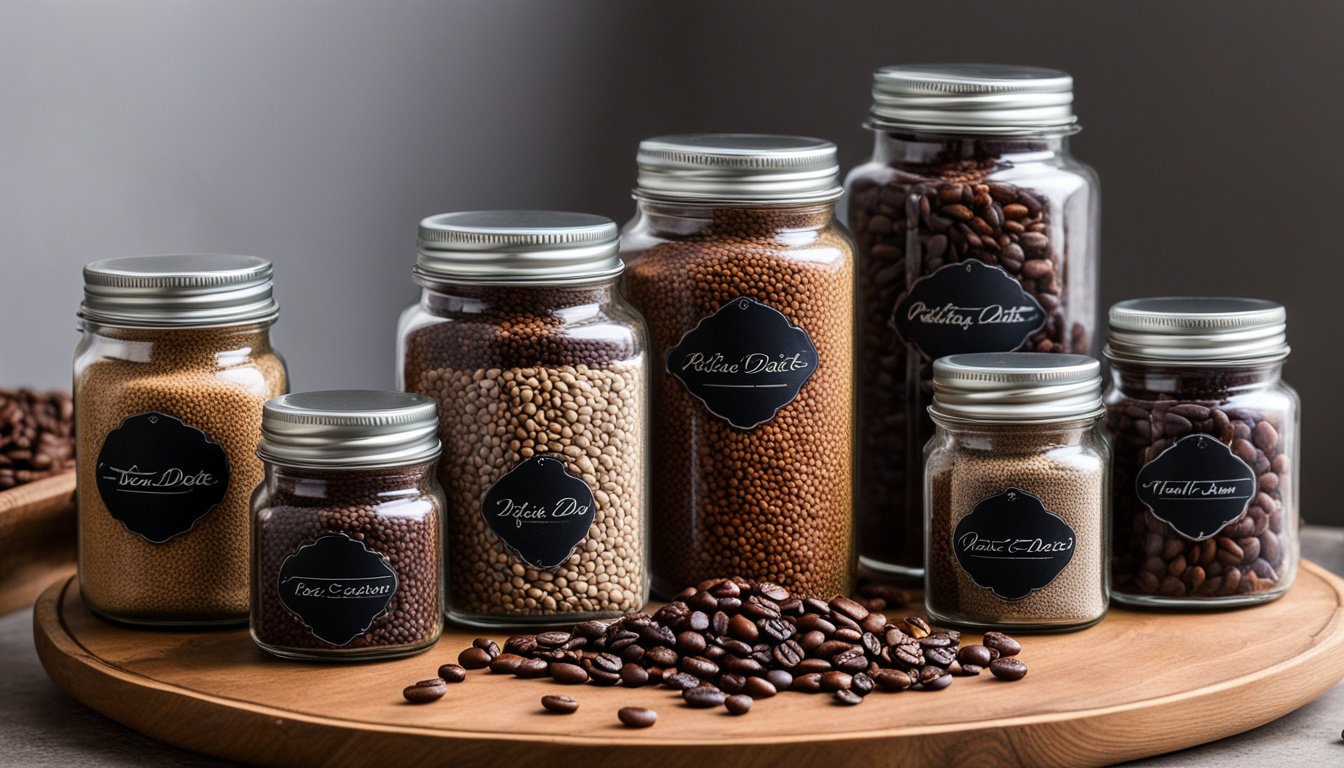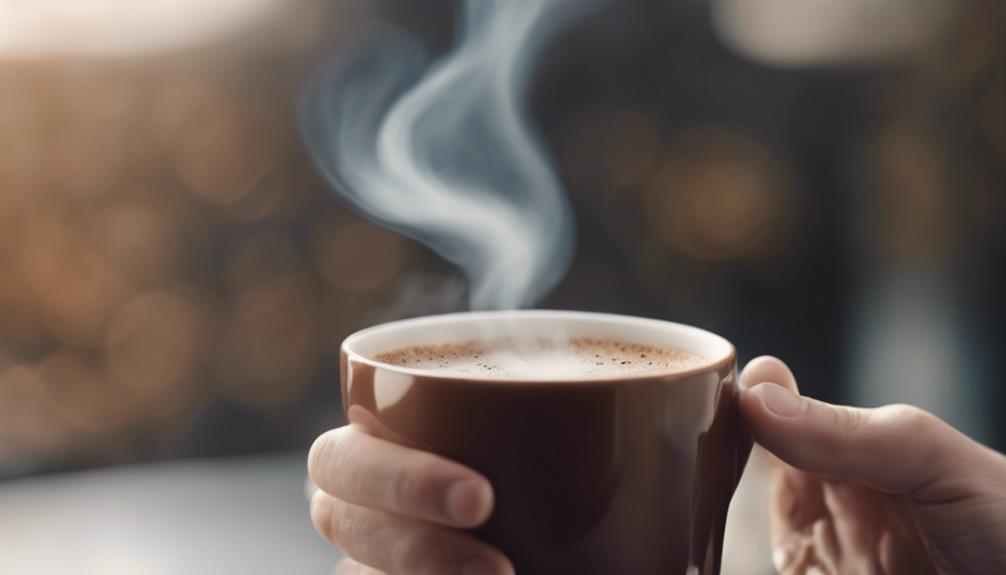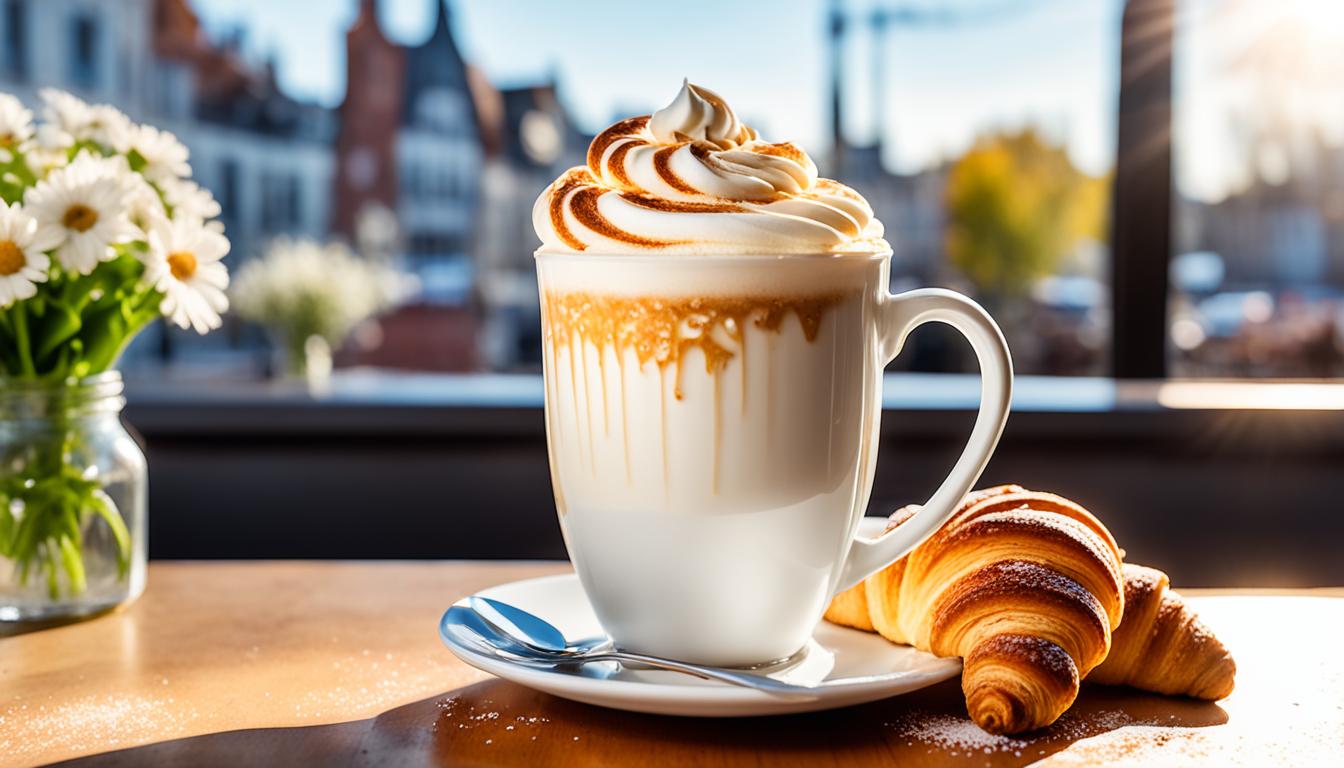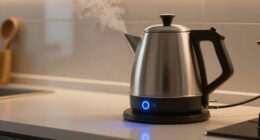Freshly roasted coffee beans only stay fresh for 90 days. Proper coffee storage is crucial for a great brew. It’s essential to not only purchase high-quality beans but also to understand how to store them correctly. This will help preserve the rich flavor and iconic aroma.
Many coffee lovers don’t realize ground coffee starts losing freshness in minutes after grinding. It’s crucial to use good storage tips for your coffee. By doing this, coffee drinkers can fully enjoy each cup, making every sip a delightful experience.
Key Takeaways
- The ideal temperature range for coffee storage is between 50 and 70 degrees Fahrenheit.
- Ground coffee loses freshness much faster than whole beans, often going stale within minutes.
- To maintain coffee freshness, keep it in opaque, airtight containers away from heat and moisture.
- It’s best to purchase coffee in smaller batches to enjoy maximum flavor and aroma.
- Freezing coffee can help preserve its freshness for up to a month, but only if done correctly in airtight containers.
The Importance of Proper Coffee Storage
Keeping coffee properly is key to enjoying its full flavors and aromas. Coffee is sensitive to heat, air, and moisture. These factors affect how long coffee stays fresh.
Understanding Coffee’s Sensitivity
Coffee beans soak up moisture, which can ruin their quality. The National Coffee Association (NCA) says beans are freshest within 72 hours of roasting. After that, they start to lose flavor. Ground coffee goes stale even faster, ideally used within an hour of grinding. Keeping it longer, especially past a week, means humidity will harm its taste.
Impact of Poor Storage on Flavor
Poor storage makes coffee stale, losing its rich aroma and flavor. Ground coffee is especially quick to degrade in humid conditions, leading to a bitter taste. Coffee lovers suggest only keeping a week’s supply of whole beans to avoid quality loss. Store beans in an airtight container in a dark, cool spot. However, storing coffee in the fridge can make it stale due to extra moisture.
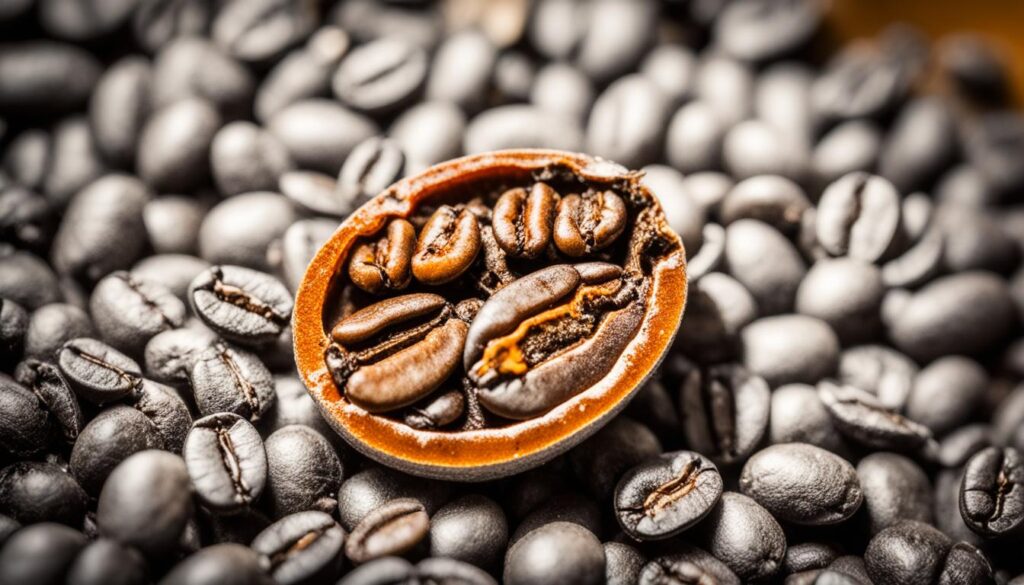
Key Enemies of Coffee Freshness
Keeping coffee fresh means knowing what harms its quality. Air, moisture, heat, temperature changes, and light are the main foes. Each one hurts the coffee’s taste and smell in its own way. So, storing coffee rightly is key for a great coffee experience.
Air Exposure
Air exposure greatly affects coffee storage. Oxygen contact leads to oxidation, making coffee’s flavor go bad quickly. This reaction lowers the coffee’s aromatic quality, leading to a stale brew.
Moisture and Its Effects
Moisture is bad news for coffee, causing mold and mildew. Too much dampness not only ruins the taste but also raises health concerns. It’s critical to store coffee in a dry, cool spot to keep it safe.
Heat and Temperature Fluctuations
Heat seriously harms coffee freshness. Changes in temperature speed up the staling, affecting the beans’ chemical make-up. To keep coffee fresh, store it where it’s between 50°F and 70°F (10°C to 21°C).
Light: The Silent Degrader
Light, especially UV rays, breaks down the coffee beans’ essential oils. This loss decreases taste. It’s important to avoid light for coffee beans, as clear containers make things worse. Choose opaque containers for longer freshness.
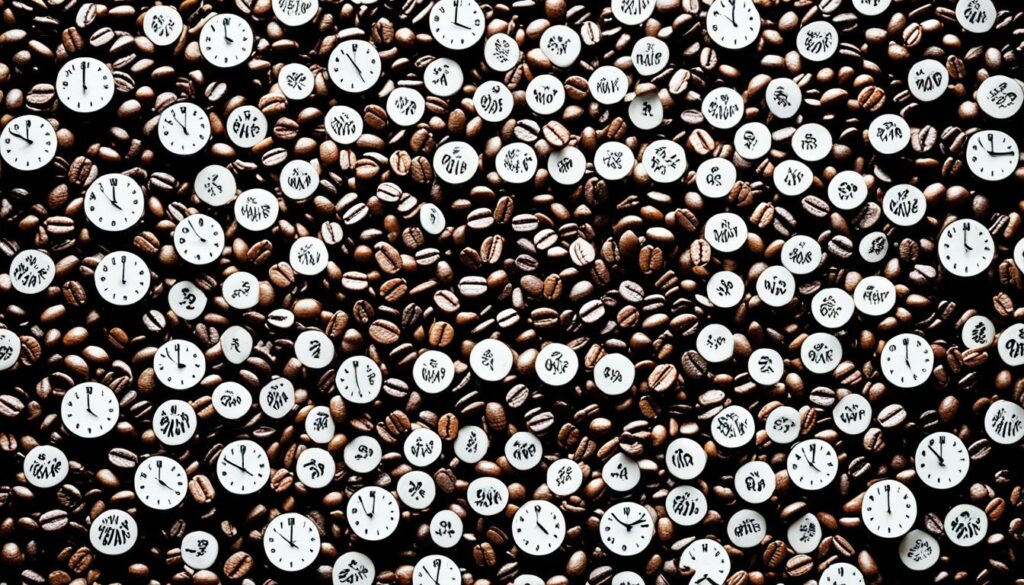
| Enemy | Effect | Prevention Method |
|---|---|---|
| Air Exposure | Oxidation, flavor degradation | Airtight containers |
| Moisture | Mold growth, off-flavors | Cool, dry storage |
| Heat | Accelerates staling | Stabilize temperature |
| Light | Decreases flavor quality | Opaque containers |
Best Practices for Storing Coffee
Keeping your coffee fresh is all about how you store it. There are some simple steps to make sure your coffee stays as tasty as when it was first roasted. These steps are easy to follow and make a big difference.
Choosing the Right Container
Finding the right container is key to keeping your coffee fresh for longer. Use airtight and dark containers. They stop air and light from spoiling the coffee. You can use:
- Airtight glass jars: Great for small amounts, but keep them from light and heat.
- Vacuum-sealed bags: They’re excellent for keeping air out and freshness in.
- Mason jars: Good for storing coffee beans, especially in the freezer.
Vacuum-sealed options are best for keeping the flavor locked in. Splitting your beans between the freezer and room temperature helps keep them fresh. Use them within a few days for the best taste.
Ideal Storage Locations
Where you store your coffee matters a lot. Keep it in a cool, dry spot away from heat and moisture. Don’t store coffee near:
- Ovens
- Dishwashers
- Heat-producing appliances
This helps avoid the beans aging too fast. Also, avoid places where the temperature changes often. Store your coffee in a dark area to protect its flavor.
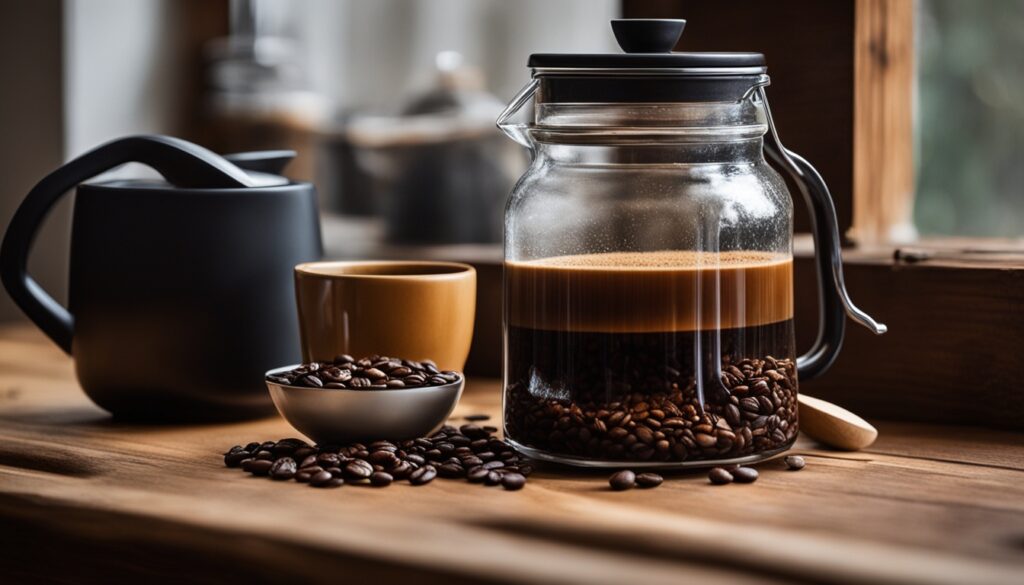
| Container Type | Benefits | Storage Recommendations |
|---|---|---|
| Airtight Glass Jars | Prevents air and moisture exposure | Keep in a cool, dark cupboard |
| Vacuum-Sealed Bags | Reduces air exposure and retains freshness | Ideal for long-term storage in the freezer |
| Mason Jars | Good for short-term storage; can be frozen | Store in the freezer or pantry |
Following these storage tips ensures your coffee stays fresh and tasty. You’ll always be ready to brew a delicious cup.
How to Properly Store Coffee to Maintain Freshness
Storing coffee right means knowing the best ways to keep it fresh. It’s all about the right temperature, air, and sealing. These factors help keep the coffee’s rich flavors and smells.
Knowing how to balance these will make your coffee taste amazing.
Room Temperature vs. Refrigeration
Most prefer keeping coffee at room temperature. This avoids humidity and strong smells, which fridges often have. Coffee does best in a cool, dark, and dry spot. But, in cold areas, some think of using the fridge. Yet, fridges can hurt the coffee’s taste because of moisture.
Keep it at room temperature in a container that blocks light and air.
The Freezing Debate
Freezing coffee is a topic with mixed opinions. Some say it’s a good way to keep coffee longer. But, it has drawbacks. Cold and moisture can make the coffee pick up bad flavors.
If you must freeze it, use small, airtight portions. This helps keep it tasting fresh when you use it later.
Vacuum Sealing Techniques
Vacuum sealing is a trusted method to keep coffee fresh longer. It takes out the air that makes coffee go stale. For those who buy a lot at once, this is perfect.
Look for vacuum-seal bags that close tightly. This ensures the coffee is protected from things that can make it stale.
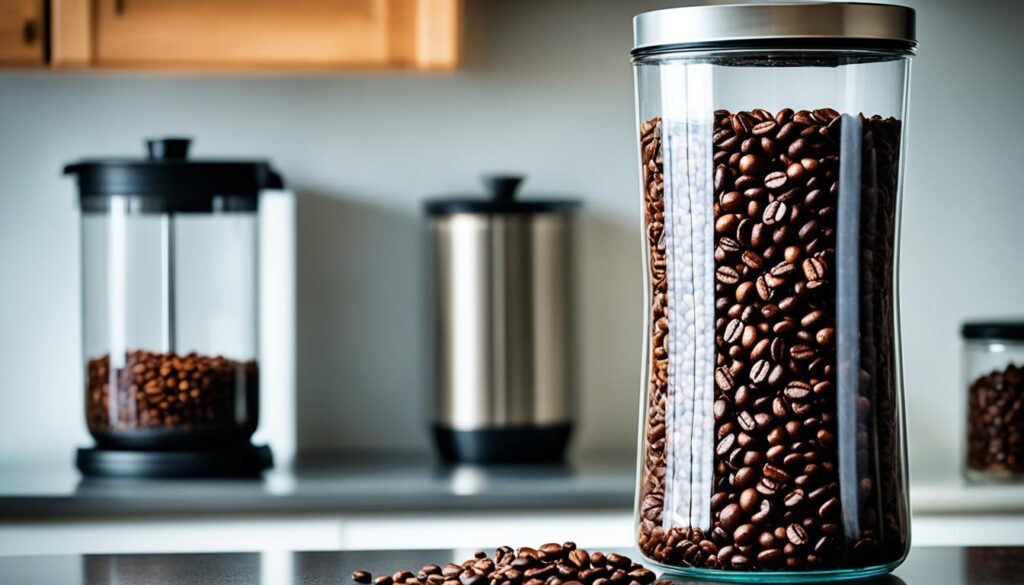
Whole Beans vs. Ground Coffee
Choosing between whole beans vs. ground coffee can really change your coffee game. Whole beans keep the flavor better and stay fresh longer. Grinding them right before brewing brings out their best taste.
Benefits of Whole Bean Storage
Whole beans last longer at their best compared to ground coffee. Their outer layer keeps them fresh. You can enjoy whole bean coffee for 2 to 6 weeks after its roasted.
Grinding coffee means more of it touches the air, and this makes it go stale faster. Whole beans don’t soak up moisture and smells as much, keeping their smell and taste.
When to Grind Your Coffee
Experts say to grind beans right before you make coffee for the best flavor. Freezing can help keep them fresh, but try to use them in a few weeks. Good coffee means watching out for air, moisture, heat, and light.
Knowing when coffee goes bad is by smelling a stale scent or seeing it look off. This means it won’t taste good anymore.
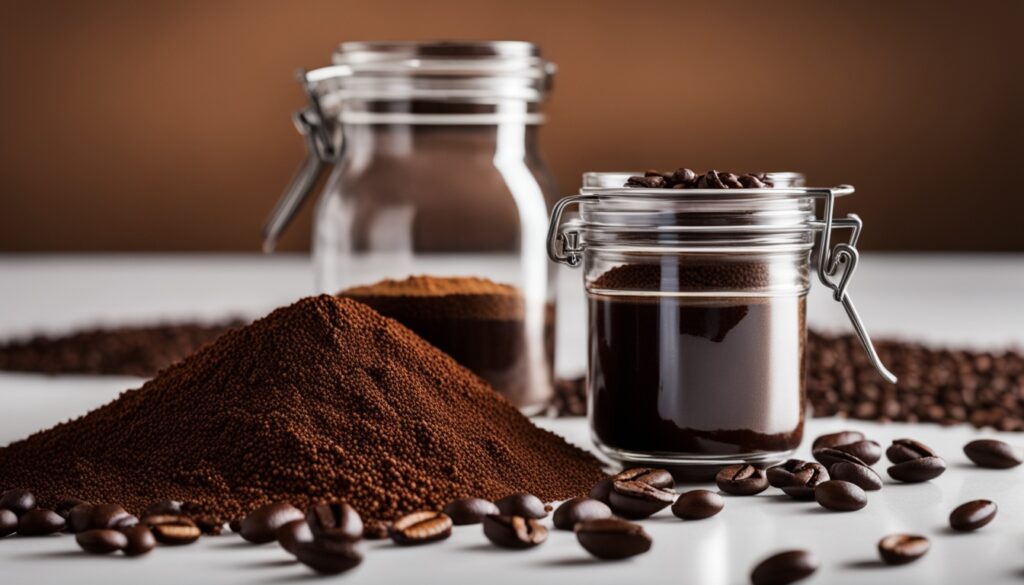
| Type | Shelf Life | Oxidation Rate | Moisture Absorption |
|---|---|---|---|
| Whole Beans | 2 to 6 weeks | Lower | Less susceptible |
| Ground Coffee | 2 to 4 weeks | Higher | More susceptible |
Buying Strategies for Fresh Coffee
Choosing the right strategies for buying coffee is key to keeping it fresh and tasty. Knowing when to buy coffee beans and how to control portions can really improve your coffee. This makes your daily cup something special.
When to Purchase Coffee Beans
Knowing the best time to buy coffee beans is essential. It’s best to choose beans roasted within the last two weeks for the best flavor. Specialty coffee roasters, like Peet’s, put roast dates on their bags. This helps you know you’re getting fresh beans.
For those buying in bulk, split the beans into smaller amounts right away to keep them fresh. Whole beans stay fresh for a month in the right container. But, ground coffee gets stale in a week. So, only grind what you’ll use right away.
Portion Control for Freshness
Controlling how much coffee you buy is important for keeping it fresh. Try to buy just enough coffee for one or two weeks. This keeps the beans from getting stale.
When making coffee, measure your portions with a scale or scoop. This way, every cup is fresh and there’s no waste. Also, storing ground coffee in zip-top bags helps keep it fresh. These bags keep out moisture and air. Follow these tips for great coffee every time.

Signs of Stale Coffee
Knowing how to spot stale coffee is key to enjoying your brew. If coffee isn’t stored right, its quality goes down. Learning to see these signs makes coffee safer and taste better.
Recognizing Quality Degradation
Coffee that’s not fresh has clear signs. Common ones include:
- Loss of aroma: Stale coffee has a weak smell.
- Color change: Unlike fresh beans, stale ones look faded.
- Taste: Your coffee will taste bitter if it’s stale.
Storing coffee properly helps keep it fresh. Use airtight containers to keep out moisture, air, and light. This can make your coffee last up to six months.
Maintaining Safe Consumption Standards
Drinking stale coffee is usually okay, but it’s not enjoyable. It’s important to check your beans often. Signs of mold or too much moisture mean it could be bad. Freshly roasted beans taste the best. This makes storing your coffee well very important for keeping it both safe and delicious.
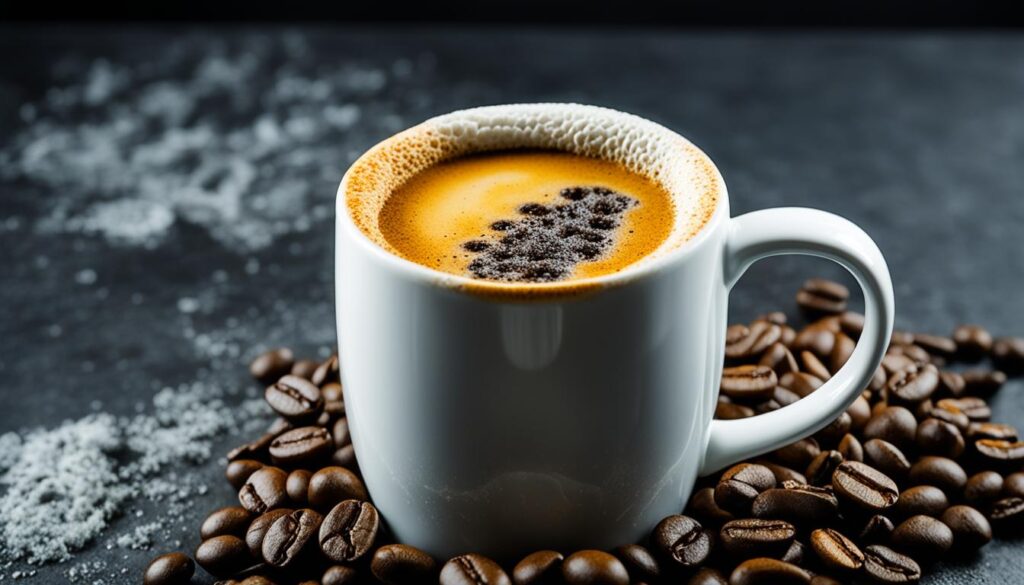
Conclusion
Understanding the right way to store coffee is key to keeping its fresh taste and smell. Whole beans stay fresh for 2-3 months past their “best-by” date if stored in a sealed container. Meanwhile, ground coffee starts to lose its great qualities just 15 minutes after grinding. It’s important for coffee lovers to know this to keep their coffee at its best.
Different ways to store coffee have a big impact on its freshness. It’s critical to keep coffee in a cool, dry spot away from light, heat, and moisture. Also, buying small amounts and using airtight containers helps enjoy every cup more. These steps let coffee fans fully enjoy their brew.
The path to the best coffee involves proper storage methods. By following the best tips and watching for signs of spoilage, you can keep enjoying the rich flavors of your favorite coffee longer. These tips ensure that each sip is a joy.
